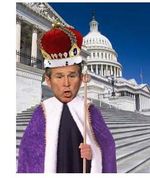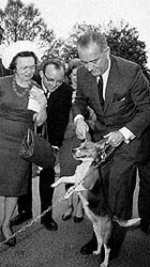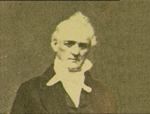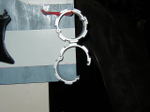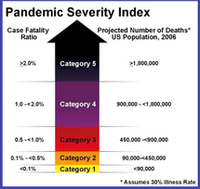Consider this Vol. 11, No. 8 for A-Clue.Com, which would be delivered to readers tomorrow if we were still doing this via e-mail. Enjoy.
In the last few weeks President Bush, worried about the legacy of this Administration, has compared himself to (among others) George Washington, Abraham Lincoln, and Harry Truman.
He sees his lack of popularity, refuses to believe it could be his direction that is wrong, and so grabs hold of the criticisms, and low ratings, sometimes given our greatest Presidents.
It’s yet more evidence of the man’s own delusion, although the symptom is natural, affecting every President when they face hard times. Legacy is something no one can control. Historians are free to damn as well as praise.
So where does Bush stack up?
Here’s a collection of names to conjure with. James Buchanan. Grover Cleveland. Herbert Hoover. Lyndon Johnson.
Each was the last of their line. Buchanan was the last Jackson Democrat, Cleveland the last President of the post-Civil War era, Hoover was the last of the Progressives, Johnson the last of the New Dealers.
These are Bush’s true peers. In fact they always were.
Like them, Bush came into office parroting the assumptions of an earlier day, in his case the Nixon Thesis of Conflict. Everything he has done in office has been based on that Thesis. His fans would call this the Reagan Thesis, and it’s fine with me if they do, because it means he’s taking Reagan’s legacy down with him as well.
Political generations are marked by distinct phases:
- Crisis, leading to the establishment of a Political Thesis, myths and values that create power.
- Validation, a leader proving the Thesis and sticking it into the public mind as assumptions that are not questioned.
- AntiThesis, the rise of a new Thesis which leans against the
existing one, as Clinton’s "Third Way" leans against Reaganism, seeking
to moderate it for transactional ends. - Climax, with new events, and a new generation, disproving the Thesis, leading to a new Crisis. (Illustration from Wolfblog via Firedoglake.)
Bush was always doomed to be a Climax politician. Politically he
created nothing himself, instead riding on the work of others. Whether
you define those others as the Nixonians, such as Dick Cheney, the
Reaganauts, who gave him his tax cut ideas, or his father, who gave him
the chance to achieve power despite a wastrel existence until age 40
(as Bush himself calls that phase of his life) it’s all like the Moon,
a reflection of others, others’ ideas and others’ legacy.
Bush has ridden these ideas to excess, leading to the present climax
state. His continual reliance on tax cuts for economic policy-making
has discredited tax cuts as a policy tool. His invasion of Iraq has
discredited the Cold War Us vs. Them assumption in animating our foreign policy.
And of course he has completely ignored the real crisis, our reliance
on hydrocarbons, something Reagan did explicitly in his victory over
Jimmy Carter and his successors have done implicitly since.
Comparing him to other Presidents of Climax, the closest comparison is
one to his fellow Texan, Lyndon Johnson (left). Johnson tried to apply the
idealism of his political upbringing, the Franklin Roosevelt Thesis of
Unity, both to the "Cold War activity" of Vietnam and the domestic
upheaval of Civil Rights. He failed. He was unable to deliver both guns
and butter. But he did leave a solid legacy, in the Civil Rights Acts
and the War on Poverty. These are achievements the next generation may
be able to build on.
The only hope for today’s Republicans is to completely reject Bush and
all his works. There are Republicans who are succeeding, right now, by
doing just that. Democratic Triumphalists should beware. Arnold
Schwarzenegger in California, Charlie Crist in Florida, and Michael
Bloomberg in New York City are all highly popular, moving just slightly
left while retaining their support among conservatives who know they’re
the only game in town.
The other Climax Presidents in our history can’t really be blamed for
what happened to them.
Hoover was actually a very good man, an engineer
and organizer who saved Europe from starvation after World War I and
organized the relief of Louisiana after its 1927 floods.
Cleveland was
actually an AntiThesis politician, leaning against the Lincoln-Grant
Thesis of northern business. It was his misfortune to be beaten by
Benjamin Harrison in 1888 despite winning the popular vote, leading to
his 1892 comeback, which left him in office when the economy collapsed
in 1893.
Buchanan was merely the last in a line of impotent Presidents
— Taylor, Fillmore, and Pierce — who felt he could do nothing
because Congress ran the country. (Picture from Tulane University.)
Only Bush is mostly to blame for the Climax he has led us to. His
Administration has been an unmitigated disaster on so many levels. His
legacy, except for the Supreme Court terms of John Roberts and Samuel
Alito, will be wholly rejected, tossed away, and people will try very
hard to forget him.
There is just one thing that could go terribly wrong, and he’s on his
way to doing it. Should Bush’s present escalation lead to war with
Iran, the anger now building could easily lead to his being sent to the
Hague, to face trial as a war criminal.
There is no immunity for war
crimes, no statute of limitations, no pardon available. Historically,
it’s the most fitting end to a Thesis of Conflict, an era that gained
strength by creating enemies, and imagining the strongest nation in the history of Earth as a weakling, surrounded by terrible foes, fearful, and terrorized.
So let Bush attack Iran, and think on the fate awaiting him at the Hague. Let him be terrorized, driven out of his mind by fear.
That would be justice, but for those killed by this Administration’s actions, especially the heroes in our Armed Forces, it would come far too late.


